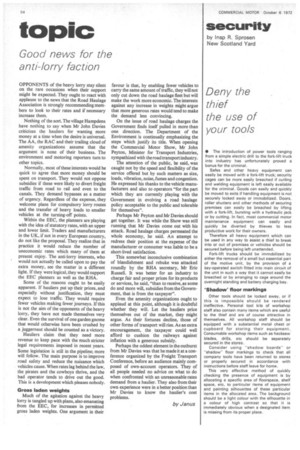topic
Page 56

If you've noticed an error in this article please click here to report it so we can fix it.
Good news for the anti-lorry faction
OPPONENTS of the heavy lorry stay silent on the rare occasions when their support might be expected. They ought to react with applause to the news that the Road Haulage Association is strongly recommending members to look to their rates and if necessary increase them.
Nothing of the sort. The village Hampdens have nothing to say when Mr John Davies criticizes the hauliers for wanting more money at a time when the desire is universal. The AA, the RAC and their trailing cloud of amenity organizations assume that the argument is none of their business. The environment and motoring reporters turn to other topics.
Normally, most of these interests would be quick to agree that more money should be spent on transport. They would not oppose subsidies if these were likely to divert freight traffic from road to rail and even to the canals. They demand bypasses as a matter of urgency. Regardless of the expense, they welcome plans for compulsory lorry routes and the transfer of heavy loads to smaller vehicles at the turning-off points.
Within the EEC, the planners are playing with the idea of statutory rates, with an upper and lower limit. Traders and manufacturers in the UK, if not in every European country, do not like the proposal. They realize that in practice it would reduce the number of uneconomic rates which many of them at present enjoy. The anti-lorry interests, who would not actually be called upon to pay the extra money, see the matter in a different light. If they were logical, they would support the EEC planners as well as the RHA.
Some of the reasons ought to be easily apparent. If hauliers put up their prices, and especially without justification, they must expect to lose traffic. They would require fewer vehicles making fewer journeys. If this is not the aim of the opponents of the heavy lorry, they have not made themselves very clear. Even the survival of one garden gnome that would otherwise have been crushed by a juggernaut should be counted as a victory.
Hauliers claim that they need more revenue to keep pace with the much stricter legal requirements imposed in recent years. Some legislation is still in the pipeline; more will follow. The main purpose is to improve road safety and reduce the nuisance which vehicles cause. When rates lag behind the law, the pirates and the cowboys thrive, and the bad operator tends to drive out the good. This is a development which pleases nobody.
Gross laden weights Much of the agitation against the heavy lorry is tangled up with plans, also emanating from the EEC, for increases in permitted gross laden weights. One argument in their favour is that, by enabling fewer vehicles to carry the same amount of traffic, they will not only cut down the road haulage fleet but will make the work more economic. The interests against any increase in weights might argue that more generous rates would tend to make the demand less convincing.
On the issue of road haulage charges the Government finds itself pulled in more than one direction. The Department of the Environment is continually emphasizing the steps which justify its title. When opening the Commercial Motor Show, Mr John Peyton, Minister for Transport Industries, sympathized with the road transport industry.
The attention of the public, he said, was caught not by the speed and flexibility of the service offered but by such matters as size, loads, vibration, noise, fumes and congestion. He expressed his thanks to the vehicle manufacturers and also to operators "for the part which they are currently playing with the Government in evolving a road haulage policy acceptable to the public and tolerable for themselves".
Perhaps Mr Peyton and Mr Davies should get together. It was while the Show was still running that Mr Davies come out with his attack. Road haulage charges permeated the whole economy, he said. An attempt to redress their position at the expense of the manufacturer or consumer was liable to be a short-lived satisfaction.
This somewhat inconclusive combination of blandishment and rebuke was attacked roundly by the RHA secretary, Mr Eric Russell. It was better for an industry to charge fair and proper prices for its products or services, he said, "than to receive, as some do and more will, subsidies from the Government, that is from the taxpayer".
Even the amenity organizations ought to applaud at this point, although it is doubtful whether they will. Let the hauliers price themselves out of the market, they might argue. As their fortunes decline, those of other forms of transport will rise. As an extra encouragement, the taxpayer could well afford to cushion the railways against inflation with a generous subsidy.
Perhaps the oddest element in the outburst from Mr Davies was that he made it at a conference organized by the Freight Transport Conference, before an audience mainly composed of own-account operators. They of all people needed no advice on what to do when confronted with an unreasonable rates demand from a haulier. They also from their own experience were in a better position than Mr Davies to know the haulier's cost problems.






































































































